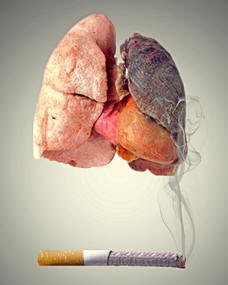Health Effect
 Simple, smoking kills. In 2019, about 14% of all deaths
worldwide in 2019 were caused by smoking, therefore, they were entirely
preventable. Despite efforts to reduce smoking, there are unfortunately
more smokers today than in 1990. Firstly, the nicotine in cigarettes is
highly addictive, making it very difficult for people to quit smoking.
But what are the health effects?
Simple, smoking kills. In 2019, about 14% of all deaths
worldwide in 2019 were caused by smoking, therefore, they were entirely
preventable. Despite efforts to reduce smoking, there are unfortunately
more smokers today than in 1990. Firstly, the nicotine in cigarettes is
highly addictive, making it very difficult for people to quit smoking.
But what are the health effects?
Consequences of Smoking
Smoking damages the heart and circulation (lungs too),
increasing the risk of diseases such as heart attack, coronary artery
disease, stroke, peripheral vascular disease, and cerebrovascular. In
addition, smoking any type of substance increases the growth of
obstructive pulmonary disease, causing about 83% of deaths and around
84% of lung cancer.
If the heart and lungs could talk, it would tell you to never start smoking, as the damage is significant. It increases your cholesterol, which can lead to blockages in your blood vessels. It also adds carbon monoxide to your blood, which reduces the amount of oxygen and forces your heart to work harder, causing palpitations. As for the visible effects, smoking leaves marks on your physical appearance, including wrinkles, stains on your teeth, alters your voice, and makes your clothes, hair, and breath smell unpleasant. Simply put, the best way to avoid all of this is simple: Don't smoke.
| Health Effect Of Smoking | |
| Type Of Effect | Description |
| Internal Health | Increases cholesterol and blocks blood vessels. |
| Heath Function | Adds carbon moxide to blood, reduces oxygen, causes heart palpitations. |
| Physical Appearence | Causes wrinkles, stains teeth, alters voice. |
| Smell | Makes clothes, hair, and breath smell unpleasant. |